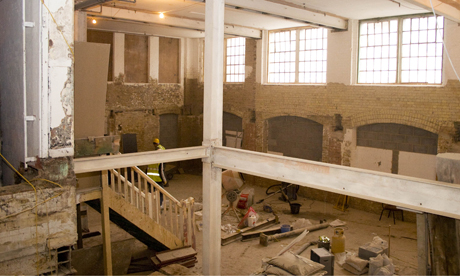Welcome to the new Arcola

A look inside the new Arcola building in Ashwin Street during building works. Photo: Laura McCluskey
It is less than a week after the final performance at the theatre’s Arcola Street venue. Now, Mehet Ergen, the Arcola’s artistic director, has led his colleagues to their new home in the Colourworks building opposite Dalston Junction. It is in this iconic building – a former factory – that Ergen plans to continue producing new and innovative works, and he is keen to tell us how the Arcola’s new home will facilitate bigger and better projects.
“One of the key differences between the two buildings is the height of the ceiling in our main studio. Technically, it’s a very important element, and we now have double the ceiling height than we did before. The staging opportunities and creative scope for designers that this offers is huge, and it’s something we will definitely work to its full advantage”, he says. Ergen is right, the ceiling is huge, and in its current state of disarray the main studio feels like a cavernous pit.
The new space boasts many other structural improvements. With the main theatre seating up to 200 people, the second studio up to 100, and two spacious rehearsal rooms, this new premises is a remarkable step-up in terms of scale. Its proximity to the transport links of both Dalston Junction and Kingsland stations welcomes audience members who could not have accessed Arcola Street with such ease. Despite these improvements to strive for ‘bigger and better,’ the Arcola ethos pulses through the walls of this building just as much as it did the last, in a reassuringly bohemian manner.
“In terms of texture, there isn’t much difference, we’re again embracing an old factory so it will feel both classical with the glass and exposed bricks and steel columns and also very modern, as you’re producing plays in an environment that does not look like a theatre,” says Ergen.
True to its eco-friendly form, the theatre has ensured that as much recycling of materials has been done as possible. The wooden floorboards in the rehearsal room (which is currently the most polished of all the spaces) have been salvaged from the old building, and are hundreds of years old. “We’re recycling everything in the building so we’re keeping the spirit of the place not trying to make a sort of trendy, newer rehearsal room out of it. That’s not our aim,” explains Ergen.
Also producing their own energy with fuel cells in the foyer, and using sustainable materials throughout, the Arcola will benefit from the space. “We want to enjoy the improvements – we now have bigger rehearsal spaces with lots of natural light rather than our old basement space which was too small and too dark. But this isn’t a re-vamp. We aren’t ‘doing anything up’ so to speak”.
The opening night of the Arcola’s first show in the Colourworks Factory is scheduled for [today] 12 January, and although it’s hard to believe that the builders will exit the building long before an audience will enter, this is vital to the production. Written by Rebecca Lenkiewicz, and commissioned for the new space, The Painter tells the tale of the English romantic landscape artist J M W Turner. In an homage to the Colourworks factory (which formerly manufactured paint materials for artists) the Arcola’s first new show will present the building itself as an artists’ studio.
Ergen explains, “That’s partly why I wanted to direct the piece. Because whatever state the place is in, as long as it passes health and safety, it’ll work! It will look the way an old paint factory would if an artist had just taken residency in 1800. We have a fantastic art team and designer, so it will be turned into a studio and the audience will really be able to feel what it would have been like in this building.”
As well as saluting its new home, The Painter is a nod to the Arcola’s history, describes Ergen, “Rebecca’s first play opened the Arcola ten years ago. Back then, she wasn’t all that well known, but since then she’s gone on to become a major playwright and the first woman writer to have a play produced on the Olivier stage at the National theatre. To be working with her again is very special, and it’s nice for the theatre to have come full circle”.
With its bric-a-brac look and bohemian ethos, the Arcola has found a new home that fits like a glove, and promises to facilitate the unique work that the theatre has produced in the past decade. Asked to describe the ‘Arcola aesthetic,’ Memet Ergen simply says what he sees, “It’s quite down to earth, we’ve never been about hyped-up marketing or flashy customer experience. There’s chairs all over the place that don’t match each-other and wooden tables that look like they’ve come out of sets of other plays, which they often have. But we spend all our energies and all our funds into making amazing productions. That’s always been our focus, and that won’t change.”
Arcola Theatre
24 Ashwin Street
Dalston E8 3DL
